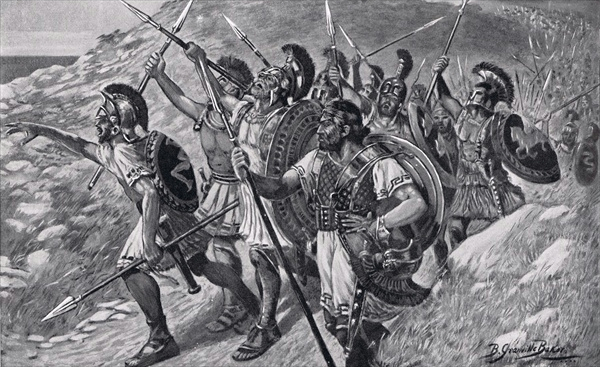Θάλαττα, θάλαττα — The Sea! The Sea! — by Bernard Granville Baker 1901
"A more fatal result of the rebellion of Cyrus the younger than his death was its revelation of Persian weakness, and of the ease with which a Greek army could penetrate to the very heart of the empire, defeat the largest army which might take the field against it, and remain in the country or retire, as it might choose. Hitherto Grecian statesmen regarded Babylon, Susa, Ecbatana, and Persepolis as distant places which it would be sheer recklessness to attempt to reach by force of arms, and from which it would be the height of folly to think a single individual would be able to return alive without the Great King's permission. Thenceforth the Greeks considered the occupation of these great cities as only a question of time. The general belief of Persia's inaccessibility gave place to a conviction that the heart of the empire could be penetrated with great ease.
"Not only the march to Cunaxa, but the skillful and safe retreat of the Greek allies of Cyrus from that memorable field -"the Retreat of the Ten Thousand"- contributed to this wonderful change of opinion in the Hellenic mind. The safe return to Greece of ten thousand men, who had routed the hosts of the Great King in the center of his vast dominions, and fought their way back to the sea for a thousand miles without any further loss than the ordinary casualties of war, was at once an evidence of the vulnerability of the Medo-Persian Empire and of the incalculable superiority of Grecian to Asiatic soldiers. If a small Greek army, without maps or guides, might make its way for a thousand miles through Asia without meeting an enemy whom it could not vanquish with ease, it was evident that the whole fabric of Persian power was so rotten that it would topple over if exposed to a formidable attack. Thus the famous retreat was as important as the battle of Cunaxa itself. The fact of this safe retreat, and not the manner in which it was accomplished, had an important bearing on the subsequent history of Persia. The retreat was safely conducted, in spite of the military power of the empire, and notwithstanding the basest and most cruel treachery. The Greeks, though deprived of their leaders by a treacherous massacre, deceived, surprised, and hemmed in by superior numbers, amid terrific mountains, precipices, and snows, under the skillful leadership of Xenophon, forced their way to Trapezus (now Trebizond) on the Euxine, losing less than a fourth of their number during the retreat."
- Ancient oriental nations and Greece by Israel Smith Clare, pages 439-440
"Not only the march to Cunaxa, but the skillful and safe retreat of the Greek allies of Cyrus from that memorable field -"the Retreat of the Ten Thousand"- contributed to this wonderful change of opinion in the Hellenic mind. The safe return to Greece of ten thousand men, who had routed the hosts of the Great King in the center of his vast dominions, and fought their way back to the sea for a thousand miles without any further loss than the ordinary casualties of war, was at once an evidence of the vulnerability of the Medo-Persian Empire and of the incalculable superiority of Grecian to Asiatic soldiers. If a small Greek army, without maps or guides, might make its way for a thousand miles through Asia without meeting an enemy whom it could not vanquish with ease, it was evident that the whole fabric of Persian power was so rotten that it would topple over if exposed to a formidable attack. Thus the famous retreat was as important as the battle of Cunaxa itself. The fact of this safe retreat, and not the manner in which it was accomplished, had an important bearing on the subsequent history of Persia. The retreat was safely conducted, in spite of the military power of the empire, and notwithstanding the basest and most cruel treachery. The Greeks, though deprived of their leaders by a treacherous massacre, deceived, surprised, and hemmed in by superior numbers, amid terrific mountains, precipices, and snows, under the skillful leadership of Xenophon, forced their way to Trapezus (now Trebizond) on the Euxine, losing less than a fourth of their number during the retreat."
- Ancient oriental nations and Greece by Israel Smith Clare, pages 439-440
 |
| Θάλαττα, θάλαττα — The Sea! The Sea! — by Bernard Granville Baker 1901 |
Source:
https://commons.wikimedia.org/wiki/File:10000-03.jpg
Quote:
https://books.google.com/books?id=CrJR9Nf80iEC&printsec=frontcover#v=onepage&q&f=false


Comments
Post a Comment